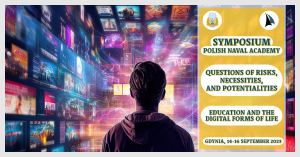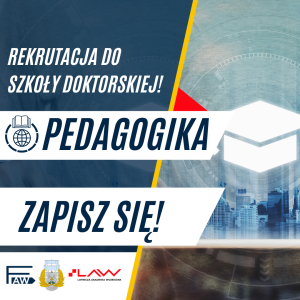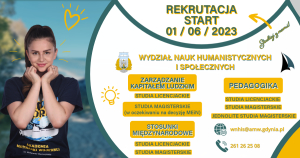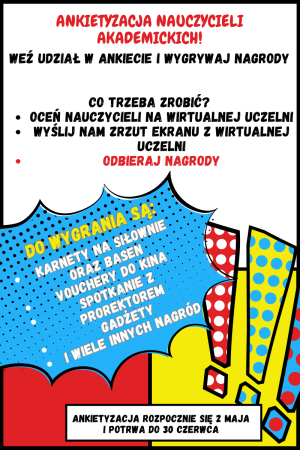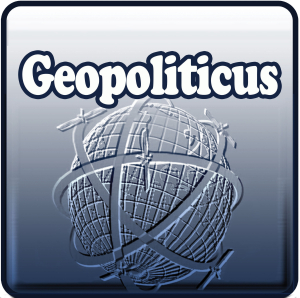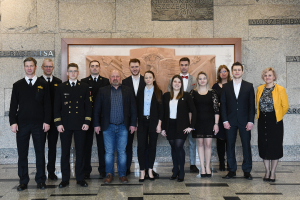dr Patrycja Bałdys
Symposium Education and the Digital Forms of Life: Questions of Risks, Necessities, and Potentialities
Symposium
Education and the Digital Forms of Life:
Questions of Risks, Necessities, and Potentialities
Gdynia, 14-16 September 2023
There is arguably a little doubt that we are now in the moment of a significant shift that is probably even more profound than the one caused in early Modernity by the Gutenberg invention. Digital technologies networked into a cosmic constellation of incomprehensible size and scope became a part of our life, or maybe – to be more precise – should be seen as the environment within which we live today. The experience of the pandemic displacing schooling from school buildings to virtual rooms of conferencing apps made apparent some immature but direct possibilities of turning education into a digital mode. As if finally the Cartesian dream could come about and we could get rid of our bodies in education. However, on the more subcutaneous level, this shift is already at work. Our daily practices regarding knowledge: what it is, where to find it, how to look for it, and judge what is the truth – are immersed in the digital cosmos. To know is – for much of us – to browse, and this is precisely why some claim that school soon will no longer be needed (cf. Sugata Mitra). Fact-checking (a verb recently created in order to deal with the side (?) effects of the digital public sphere) is something we do by googling things out (to use another endemic expression). As if Google became the touchstone of truth.
Moreover, it seems that the environment of social media and the engagement they engender opened the possibility of a digital life (cf. Tim Markham). One can – through one’s various avatars – live one’s life online: where a post is a sign of life, and a comment or a reaction to this post is a confirmation of existence. Human interactions and relations are not only moved to, but also initiated, moderated, and shaped by the digital environment leading to the establishment of practices (e.g. avataring, scrolling, browsing, texting, sharing, hacking, tagging, taking selfies, cancelling, trolling, etc.) and phenomena (e.g. virality, #tags, etc.) that are unique to the digital. This means also that our daily practices are shaped or mediated by what the digital has to offer: instead of making notes we can take a photo, instead of alarm clock we can use our smartphone, instead of going to the cinema we can stream – etc.
This omnipresence of the digital seems naturalised, and even now – when writing this call – it seems difficult to gain a distance to the fact that this text emerges, will be distributed, read, and responded to through digital means. The idea for this symposium stems from this immense closeness, of this irresistible immersion in the digital forms of life.
This leads us to the questions of necessities: who can afford to stay off line today? What it takes to be screened off the screen and its allure? How can we resist the consumption of our attention by the digital cosmos? Can there be free time (schole) where we are notified constantly by the network about new posts, comments, reactions, messages, emails…? What it means to suspend the digital and focus our attention on the matter of study? Is there a possibility for not being engaged (cf. Bartleby, the Scrivener), for not clicking? Is clicking a necessity today for us? (Let’s note that this text is saved to the hard drive by a click, and then uploaded and sent out by a click, and then – hopefully – received and opened with a click).
Naturally, there are also some obvious (though, fundamentally important) educational questions that rise again in this new context: what is knowing?, what is learning?, what is the world, and is it common? These gain their new importance through the emerging knowledge about the functioning of the Internet, i.e. the omnipresence of digital footprint (yes, the emails you did not sent in the end, are not completely deleted, but are used for profiling), the new quality of social knowledge of the – so called – big data, the way news is turned into a personalised newsfeed and close our cognitive horizon into a silo, etc.. This – on the other hand – raises fundamental questions about the digital environment itself: who is the user and who is being used? Who is the user and who is a resource of social media, email accounts, instant messengers, and other such devices?
The revelations of the internal research and policy of the big tech corporations delivered by Frances Haugen through WSJ reveal the real dangers that the social media mechanisms have for children and teenagers. These lead us to a more general questions of risks of living online: what is there to lose? What are the threats? What it means to be a newcomer in a digitalised world? What happens to the young who inhabit a world that is not understood by the adults? How can we relate to the new generation, and what we might pass them on – where everything seems to be available through the touch of a finger?
It is legitimate to ask today – for example – whether the absence of the distance towards the digital, i.e. the nature of our unnoticeable and naturalised immersion in this environment takes away the ontological conditions for introducing new beginnings to the world, for human action. Within the digital regimes of the new – it seems – newness is produced every day with “the speed of light” (now also with the computing power of AI) and hence, the newcomers, living in the digital, are set up to follow this continuously generated newness – to permanently respond to the constantly emerging new, rather than to introduce their own initium. (Regardless of whether this everyday produced newness is (or can be) really new (in the radical sense) or is it just the effect of recycling).
But then the digital network is also rich. It has a lot to offer. In a way, it is a dream come true for educationalists: it gives access to the heritage of humanity to the extent that was impossible to imagine ever before. Therefore, we arrive at the most important questions of potentiality of the digital: whether and how education and the digital forms of life can come together strengthening or engendering potentialities of the new generation?
Keynote speakers: prof. Bianca Thoillez Ruano (Universidad de la Rioja), prof. Joris Vlieghe (KU Leuven), Phd Stefano Oliverio (Universita degli Studi di Napoli Federico II), PhD Marc Fabian Buck (FernUniversitat Hagen), PhD Karsten Kenklies (University Strathclyde), Jesse Albert Torenbosch (KU Leuven), Pia Rojahn (Bergische University Wuppertal), dr hab. Jerzy Kojkoł, prof. AMW, dr hab. Astrid Męczkowska-Christiansen, prof. AMW, dr hab. Piotr Zamojski, prof. AMW.
Rekrutacja do szkoły doktorskiej
Zapraszamy do podjęcia kształcenia w Szkole Doktorskiej Federacji Akademii Wojskowych, którą tworzą Akademia Marynarki Wojennej oraz Lotnicza Akademia Wojskowa.
Od 1 lipca do 31 sierpnia 2023 roku trwa I etap rekrutacji do Szkoły Doktorskiej Federacji Akademii Wojskowych w dyscyplinach:
- Pedagogika (4 miejsca),
- Nauki o bezpieczeństwie (4 miejsca).
Kształcenie w ramach Szkoły Doktorskiej Federacji Akademii Wojskowych obejmuje cztery lata akademickie, tj. 8 semestrów i przewiduje łącznie 390 godzin zajęć. Program pozwala rozwinąć kompetencje niezbędne do prowadzenia badań naukowych i przygotowania rozprawy doktorskiej. Każdy doktorant, kształcący się w ramach Szkoły Doktorskiej Federacji Akademii Wojskowych, będzie otrzymywać stypendium.
Zapraszamy do zapoznania się z programami kształcenia w obu dyscyplinach – ZOBACZ! (https://www.faw.edu.pl/images/szkola_doktorska/Programy_ksztalcenia_w_szkole_doktorskiej_FAW.pdf)
Jeżeli jesteś zainteresowany rozpoczęciem kształcenia w Szkole Doktorskiej to koniecznie zapoznaj się z zasadami rekrutacji – ZOBACZ! (https://www.faw.edu.pl/index.php/pl/informacje-biezace/wytyczne-dotyczace-rekrutacji-do-szkoly-doktorskiej-faw)
Jeżeli masz pytania to zapraszamy do kontaktu:
Ten adres pocztowy jest chroniony przed spamowaniem. Aby go zobaczyć, konieczne jest włączenie w przeglądarce obsługi JavaScript.
Ten adres pocztowy jest chroniony przed spamowaniem. Aby go zobaczyć, konieczne jest włączenie w przeglądarce obsługi JavaScript.
Łukasz Wyszyński – Przewodniczący Komisji Rekrutacyjnej SD FAW
Tel. 502-760-252
Wydłużenie terminu wyboru przedmiotów ogólnouczelnianych
W związku z niewypełnieniem limitów w zakresie przedmiotów ogólnouczelnianych wydłużony został termin ich wyborów do 14.07.2023 r. Po tym terminie studenci, którzy nie dokonają wyboru zostaną przypisani przez administratora do przedmiotów, których limit nie zostanie wypełniony.
Zapraszamy na studia licencjackie, magisterskie i jednolite magisterskie
Ruszyła rekrutacja, która potrwa do 31 sierpnia. Zapraszamy na studia na kierunkach:
- stosunki międzynarodowe (studia licencjackie i magisterskie),
- zarządzanie kapitałem ludzkim (studia licencjackie i magisterskie*)
- pedagogika (studia licencjackie i magisterskie)
- jednolite studia magisterskie pedagogika przedszkolna i wczesnoszkolna.
Wszystkie informacje na temat naszego Wydziału, kierunków studiów i naszych działań znajdzie Pani na naszej stronie internetowej. Zapraszamy również do odwiedzania strony Wydziału na Facebooku: https://www.facebook.com/wnhis.amw i Instagramie: https://www.instagram.com/wnhisamw/
* Studia magisterskie na kierunku zarządzanie kapitałem ludzkim zostaną uruchomione po uzyskaniu zgody MEiN.
Ankietyzacja nauczycieli akademickich
Drodzy Studenci!
2 maja w Wirtualnej Uczelni zostanie uruchomiony kwestionariusz ankiety oceniającej nauczycieli akademickich. Przypominamy, że ankieta jest całkowicie anonimowa. Można ją wypełniać do 30 czerwca. Zachęcamy do wypełniania kwestionariuszy. Dodatkową atrakcją w tym roku będzie loteria szczegóły znajdziecie poniżej.
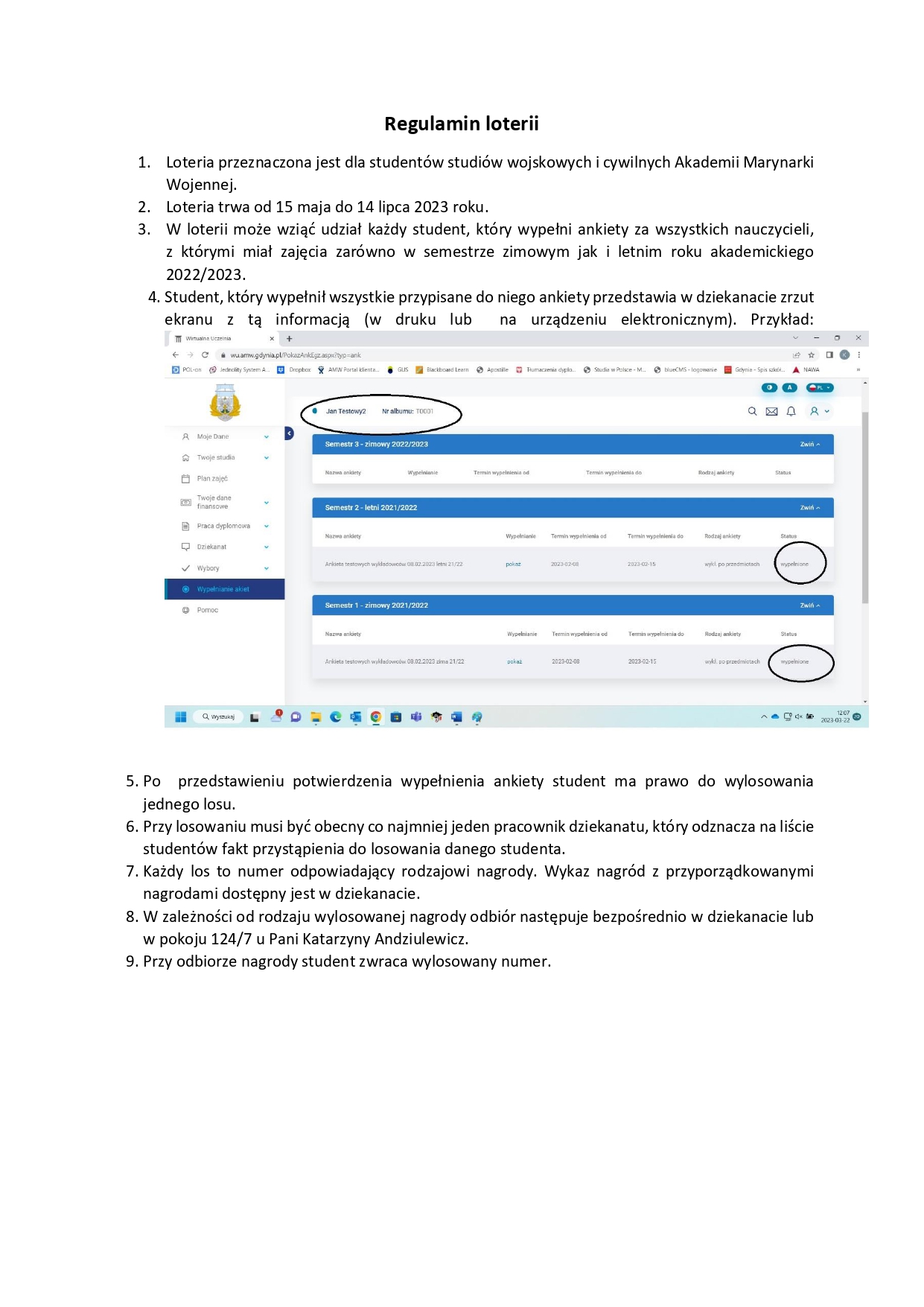
Kolejne spotkanie Koła Naukowego Geopoliticus
Już w ten piątek o godzinie 9.00 w gabinecie 131/5 odbędzie się kolejne spotkanie Koła Naukowego Geopoliticus. Wszystkich zainteresowanych serdecznie zapraszamy!!!
Życzenia wielkanocne Dziekana WNHiS
W tym świątecznym czasie składamy Państwu najserdeczniejsze życzenia,
zdrowia, szczęścia oraz nadziei i sił,
z którymi bez problemu pokonacie wszystkie trudności.
Koło Geopoliticus zaprasza
Prof. Gracjan Cimek zaprasza na organiacyjne spotkanie Koła Naukowego "Geopoliticus", które odbędzie się w piątek 31 marca o godz. 9.00 w gabinecie 131/5. Zapraszamy, aby wyruszyć z nami w rejs na głębokie wody wiedzy o współczesnym świecie!
Sukcesy naszych studentów w eliminacjach uczelnianych Konkursu Czerwonej Róży
22 marca odbył się etap uczelniany Konkursu Czerwonej Róży. Nasz Wydział w kategorii Najlepszy Student reprezentowały studentki II roku studiów magisterskich na kierunku stosunki międzynarodowe - pani Klaudia Kamińska i pani Dominika Chmielewska. W zmaganiach uczestniczyli również przedstawiciele Koła Naukowego Młodego Menadżera, sukcesy którego prezentował pan Przemysław Niźnik, student pierwszego roku studiów magisterskich na kierunku stosunki międzynarodowe. Rywalizacja w kategorii Najlepszy Student była bardzo zacięta. O zwycięstwie zadecydowała minimalna różnica głosów. Ostatecznie do finałowego etapu konkursu, który odbędzie się 16 maja w Akademii Muzycznej im. Stanisława Moniuszki w Gdańsku zakwalifikowało się nasze Koło. Wszystkim uczestnikom dzisiejszych zzmagań gratulujemy i trzymamy kciuki za nasze Koło.
Konkurs Czerwonej Róży jest wyjątkowym wydarzeniem dla studentów i kół naukowych województwa pomorskiego. Organizowany jest od 1962 roku, statuetka trafia do rąk wybitnych, wyróżniających się studentów i kół naukowych. Kandydatów zgłaszają władze pomorskich uczelni wskazując po jednym kandydacie w każdej kategorii. Warto dodać, że w konkursie wygrywają kandydaci, którzy łączą pasję naukową, aktywność społeczną i pozanaukową. Na najlepszych oprócz statuetki czeka nagroda w postaci samochodu dla najlepszego studenta i 15 tysięcy złotych dla kola naukowego.
Więcej o Stowarzyszeniu Czerwonej Róży i Konkursie można przeczytać na stronie
Życzenia Dziekana WNHiS z okazji Dnia Kobiet
Z okazji Dnia Kobiet pragnę życzyć wszystkim Paniom szczęścia, wszelakiej pomyślności, satysfakcji w życiu zawodowym i prywatnym.
Oby ten dzień był dla Was wyjątkowo i oby nie zabrakło w nim powodów do uśmiechu.
Dziekan WNHiS
dr hab. Jerzy Kojkoł, prof. AMW







